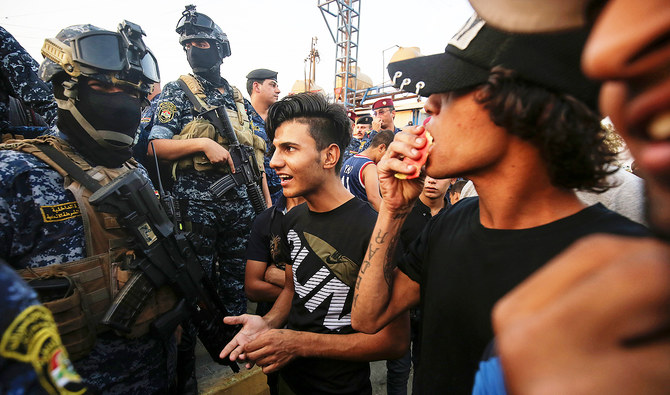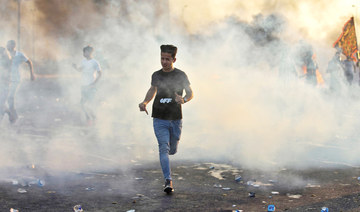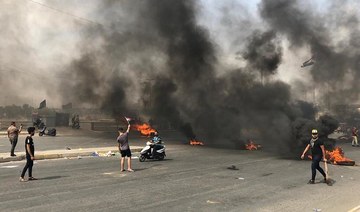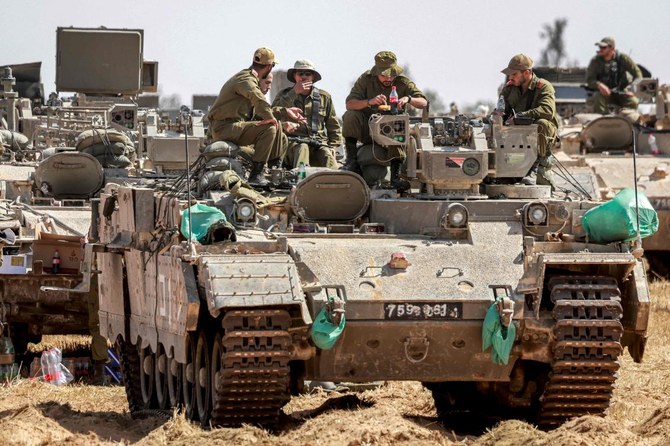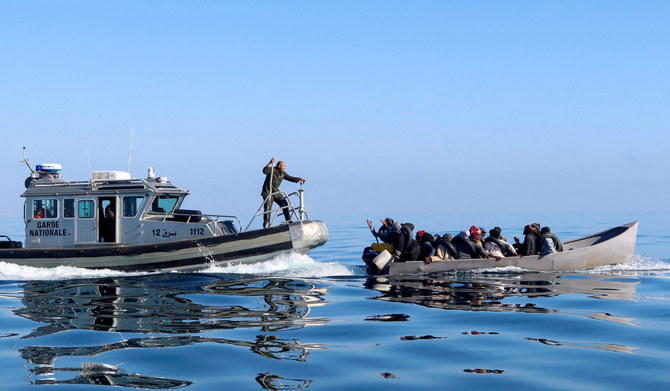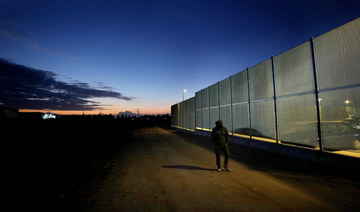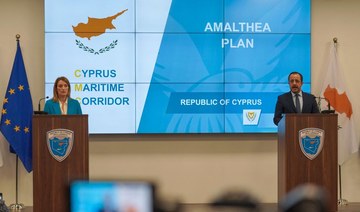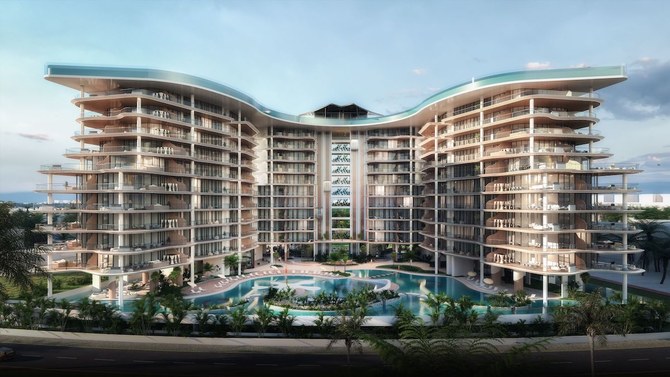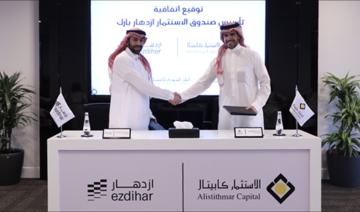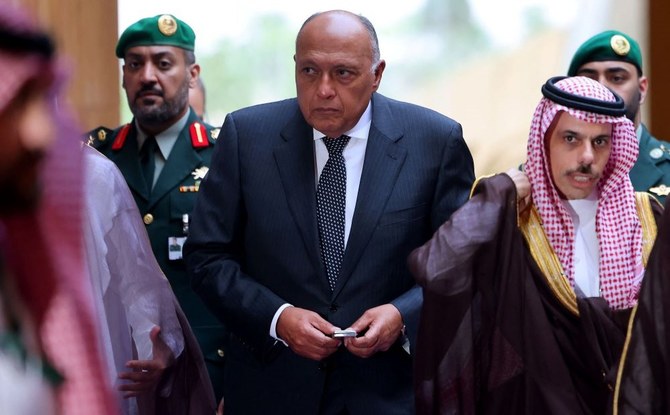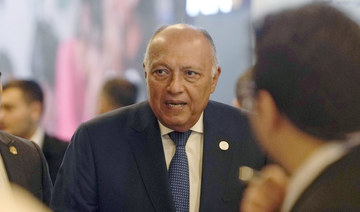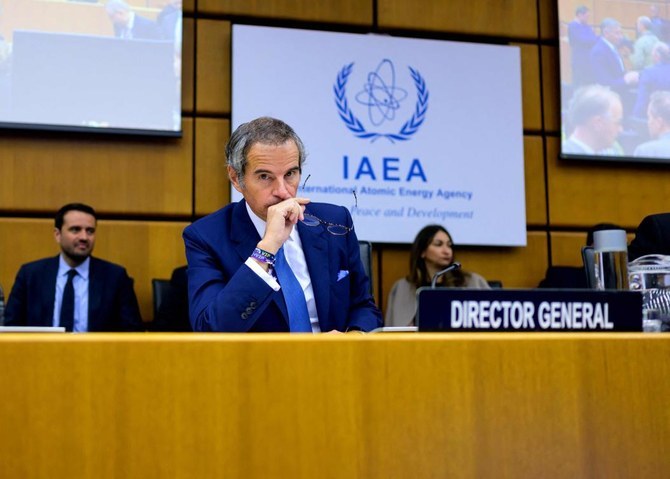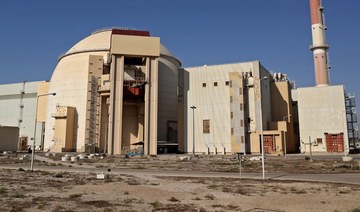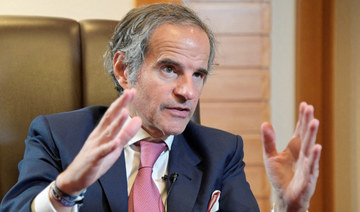BAGHDAD: Protesters began gathering in Baghdad’s Sadr City district late on Monday after overnight clashes with security forces spread to the vast, poor swath of the Iraqi capital for the first time killing 15 people.
The night of violence pushed the death toll after a week of unrest to 110 people. They were mostly protesters demanding the removal of the Iraqi government and overhaul of its political class, as security forces carried out a heavy-handed crackdown on demonstrators.
The spread of the violence into Sadr City on Sunday night poses a new security challenge for authorities dealing with the worst violence in the country since the Daesh group was defeated nearly two years ago.
Unrest is historically difficult to put down in Sadr City, a volatile district where about a third of Baghdad’s 8 million people live in narrow alleys, many with little access to electricity, water and jobs.
Things were quieter on Monday. The military withdrew troops and handed over patrols of the district to federal police early in the day, an indication authorities want to avoid clashes with supporters of the powerful opposition cleric Moqtada Al-Sadr who has called for the government to step down.
A Sadr City resident reached by phone told Reuters that the streets were calm during the day. Local militiamen were coming to inspect damage and police were deployed around the district’s neighborhoods.
The uprising over the past week has abruptly ended two years of relative calm unseen in Iraq since the fall of Saddam Hussein in 2003. Many Iraqis, especially young people, say entrenched government corruption means they received no benefit from returning stability after years of foreign occupation and sectarian civil war.
Critics say the government’s fierce response to the protests has inflamed public rage.
Reuters journalists have witnessed protesters being killed and wounded by snipers from the security forces firing into crowds from rooftops though the interior ministry denies government forces have shot directly at protesters.
The Internet was restored on Monday afternoon, after being shut down across the country for days. But the communications vacuum allowed discontent to spread.
“The crackdown plus the Internet blackout are angering people and it won’t calm the situation,” Jassim Al-Hilfi, a lawmaker from the bloc of Moqtada Al-Sadr, who is boycotting parliament, told Reuters.
“People will not be silenced, and the politicians are not capable of meeting their demands.”
Opinion
This section contains relevant reference points, placed in (Opinion field)
President Barham Salih, whose role is normally above the day-to-day political fray, condemned attacks on protesters and the media, and called for an investigation into the violence.
“Our security forces, in its various forms, must defend and support the people,” Salih said in televised remarks. “They must firmly confront those who violated the constitution by attacking citizens and the security forces, and terrorizing the media.”
In his address, he also called for ministerial changes and electoral reforms to address protesters’ grievances, adding that those affected by the violence this week should be compensated.
Demonstrators have been calling for “the downfall of the regime,” echoing demands in Arab Spring protests that swept across the Middle East in 2011. It is unclear how their demands could be met by the powerful Shiite religious parties that have dominated the country since Saddam’s fall and show no sign of willingness to relinquish control.
Those parties control armed militia which gained influence in the war against Daesh. They also have strong backing from Iran, creating a potential international dimension to the crisis in a country that is a client and ally of both Tehran and its biggest foe, Washington.
Iran’s Supreme Leader, Ayatollah Ali Khamenei, tweeted on Monday: “#Iran and #Iraq are two nations whose hearts & souls are tied together. ... Enemies seek to sow discord but they’ve failed & their conspiracy won’t be effective.”
The protests began spontaneously in Baghdad and southern cities, without public support from any major political faction in Iraq.
They have since spread to other areas, mainly populated by members of the Shiite majority. The unrest poses an unprecedented challenge for Prime Minister Adel Abdul Mahdi, who took office last year as a consensus candidate of the Shiite parties.
US Secretary of State Mike Pompeo told Abdul Mahdi in a phone call that he trusted the Iraqi forces and supported the Iraqi government in restoring security, a statement from the prime minister’s office said.
Abdul Mahdi said life had returned to normal, according to the statement. The government has offered to spend more money on subsidized housing for the poor, stipends for the unemployed and training programs and loan initiatives for youth.
Iraqi authorities said they would hold to account members of the security forces who “acted wrongly” in the crackdown on protests, state TV reported.
The ministry also said authorities condemned all attacks against media outlets, after reports of raids at the offices of several local and international news outlets. Iraq’s National Union of Journalists condemned the attacks, and the harassment and arrests of journalists covering the protests.
The protests precede Arbaeen, a Shiite pilgrimage when as many as 20 million worshippers trek on foot through southern Iraq in the world’s biggest annual gathering, 10 times the size of the Makkah Hajj. Iran reopened a border crossing used by pilgrims which had been shut last week.




